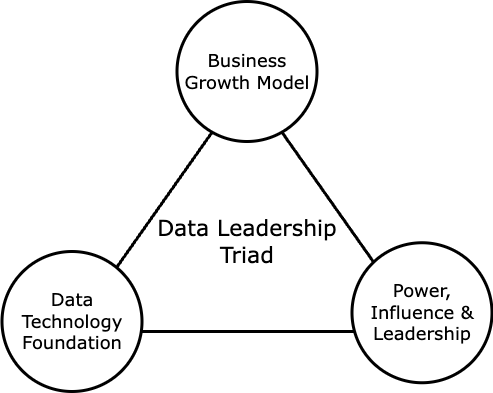The Data Leadership Triad
How data teams can gain more agency, provide more value and elevate the power of analytics
Most data teams don’t deliver value. The proof of this is in the pudding: during the past few years, after ZIRP ended, data teams everywhere have seen layoffs, reductions in budget, and constant scrutiny on technology spend.
Vendors are also struggling. Despite amazing advances in storage and computation capabilities data tools have mostly failed to live up to their hype. We all know why this happens, right?
This only happens when we—as the data team—don’t deliver meaningful value to the business.
We spend more time thinking about tech stacks than about business needs
We spend more time thinking about the performance of SQL queries than stakeholders
We spend more time arguing about data modeling techniques than about educating business folks
What’s worse we, don’t quite understand the meaning of value. And by the way, answering all the questions and building all the dashboards being requested does NOT create value. Why? I’ve talked about it before so I don’t want to rehash the argument. You can read that here.
Today I want to talk about what we can do about it. It’s time for data teams to put their foot down, speak up and advocate for their value in the organization. And I’ve got just the tool to do it.
The Data Leadership Triad
When I think about the most effective data leaders, I find that they have these three areas handled:
They understand the business model, especially how the business grows
They understand technology but are not enamored with it
They understand org behavior: how power, influence and leadership works
I call this the Data Leadership Triad.
To illustrate I will talk about an example of a data leader I spoke with recently working at a tech startup. Since I don’t have permission to talk about specifics yet, I’ll keep them and their company anonymous.
This data leader was faced with the same problems I’ve explored in depth in this blog:
An overflowing inbox of requests for data, analyses, dashboards, etc.
Leadership frustrated with the performance of the data team
Frustration and low morale on the data team who couldn’t see the impact of their work
She read my article on metric trees and decided to build one for herself.
I wanted to understand the business better so I built it just for myself at first
From what she told me, building the tree didn’t take a lot of effort but it finally helped her understand how the business worked so she could see exactly where and how her team could make an impact.
The technology part was already handled so what remained was figuring out how to get the rest of the organization to use the tree. Normally I would recommend a top-down approach here. Convince a few people at the top about the value of the metrics tree and let them impose new rules.
Surprisingly she was quite successful with a bottom-up approach. At first she got her own team to understand and start using the tree. As they started using it with their direct stakeholders, the rest of the business got to see the value of having a way to focus efforts.
By the time it reached the C-suite, everyone else was already bought-in.
Within just a few weeks of being introduced, this company-wide metrics tree became the go-to analytics tool for the entire business. It brought much needed clarity to daily operations and helped shape priorities for the data team.
The other thing she did—on the power, influence and leadership vertex—is she assigned different parts of the tree to different people on her team and told them they alone were in charge of those parts.
Assigning ownership empowered the data team, increasing their agency, boosting morale and motivating them seek way to drive more impact.
Understanding the Triad
I plan on doing more in-depth research on the triad but I will provide a teaser:
Business Growth Model
Understanding how a business grows is the most important element of delivering value as a data team. In fact the metrics tree should represent the growth model for the business. There’s a lot that’s been written about growth, in fact there are special teams that focus only on growth but as a data team it’s your job to understand this key element.
Data Technology Foundation
Much has been written about technology as this is what vendors like to focus on. A strong data leader understands enough of the technology to know the pros and cons of specific approaches, but beyond that it’s prudent for them to focus more on the business model. My advice is to get enough technology to get going and only grow if you absolutely have to.
Power, Influence and Leadership
This is the trickiest part of the triad, and the least talked about. I won’t go into too much detail here other than to say that the key to power is personal agency, aka the inclination to just get stuff done. My advice is to read Jeffrey Pfeffer books on power. The more recent one “7 Rules of Power” focuses a lot of gaining more agency inside an organization.
The future of your organization’s success hinges on data teams that dare to lead with vision, boldness, and unrelenting clarity and that’s what I plan to help them accomplish.
Until next time

Had not heard of those books on power but will check it out!